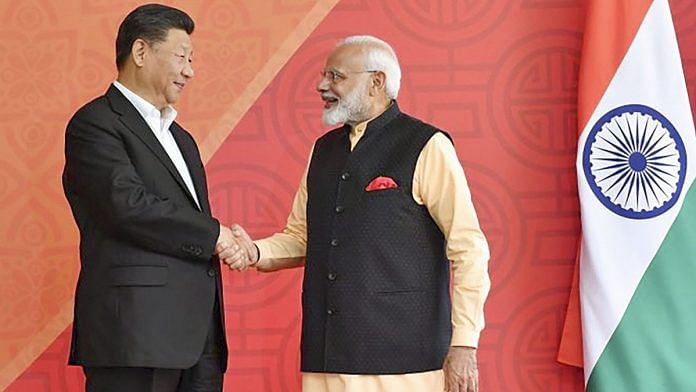After Mamallapuram, the reality of asymmetry
Shyam Saran | Former foreign secretary and senior fellow at the Centre for Policy and research
The Hindu
Saran claims that “describing India-China summits as marking a ‘new-era’,” follows a “predictable pattern,” and they rarely deserve these “high sounding labels”. He writes that the Manmohan Singh-Wen Jiabao summit “had more significant outcomes” – they established that one, India is not a threat to China and vice versa; two, there is “enough room” in the world for “both a resurgent” India and China; three, their cooperation is needed to “tackle global challenges” and four, India and China should seek an “early settlement” on border issues so they can work on “strategic dimensions” of their relations.
He notes that Mamallapuram was more of a “holding operation” to solve “differences” over Jammu and Kashmir. Saran argues that China’s strategy towards India is of neutralisation – “to inhibit India from pursuing policies inimical to Chinese interests even while accepting no constraints on its own policies”.
Saran remarks that the recent summit shouldn’t be “over-interpreted.” He suggests that in order to tackle the “asymmetry” India needs to “engage in careful and nuanced balancing,” seeking closer partnerships with other major powers that share India’s concern over “China’s penchant for unilateral assertion.”
It’s about benchmarks
Faizan Mustafa | Vice-chancellor NALSAR, University of Law, Hyderabad
The Indian Express
Mustafa writes on a judge’s decision to recuse himself from a verdict in light of Justice Arun Mishra’s refusal to recuse himself from the Constitution Bench that has to “re-examine a controversial judgement he delivered last year”. In 2014, a three-judge bench led by CJI Lodha held that compensation had to be rewarded to landowners in the Punjab Municipal Corporation case. In 2018, another three-judge bench with Justice Mishra “overruled this verdict in the Indore Development Authority case”. Since the case did not satisfy SC’s criteria for setting aside a verdict, the CJI constituted a larger bench with Justice Mishra.
He argues that “a judge should ideally recuse from a proceeding in which his impartiality might reasonably be questioned due to the possibility of personal bias or prejudice.” He adds that a judge should also “state the reasons” if he decided to recuse himself. However, Mustafa writes, a recusal must not become a “convenient method to get rid of a judge.” He calls on the country’s judicial system to “consider changing the system of hearing recusal requests” and these requests shouldn’t be “heard by the bench but only by the judge concerned”.
Is Globalisation dying?
Abheek Barua | Chief Economist, HDFC Bank
The Times of India
Barua cites think tank Capital Economics, on “de-globalisation” and notes that “roughly a third of global per capita income growth since 1990 has been due to productivity enhancements riding on globalisation.” However, he writes, a bulk of these benefits have “accrued” to the emerging markets and not advanced economies.
He states that the “obvious place” to “look for losses” in advanced economies is “labour markets.” Technological change has been the “driver of average wage and per capita growth,” but the average “obfuscates the growing difference” between skilled white collar earnings and blue collar earnings which has led to “rising inequality”.
The “strong link” between average income growth and technological change in advanced economies (AE) “has emerged” because globalisation has left AEs “with high end sectors” when survival and growth depends on “rapidity of technological change.” Barua writes that such a dependence would be much less “in a more balanced production structure”.
In conclusion, de-globalisation has a logic and a “momentum of its own.” He claims that the “biggest losers” from de-globalisation will be emerging markets that have gained the most from it and recommends a “coping strategy” to deal with it.
China’s 100-year marathon to rule the world and reshape it
Sandipan Deb | Former editor of Financial Express
Mint
Deb draws from The Hundred-Year Marathon by Michael Pillsbury, an “American China expert” and advisor to US President Trump, to show how China has diligently planned to become a “global hegemon” by 2049.
The West blindly helped China’s rise, writes Deb. Around 1979, the US funded an economic revolution in China, thinking that it would become more democratic, “while in reality it became more authoritarian” with goals of global domination.
Deception is the main principle of China’s political strategy and is rooted in ancient texts and history, especially of the Warring States period (475 BCE – 221 BCE), he adds. This explains why as Pillsbury dealt more closely with China, he noticed how “a dove turned into a hawk”.
If the world remains clueless, China will reach its 2049 goal very soon, warns Deb. However, the first obstacle will be Trump, “an unknown variable suddenly inserted into China’s strategic equation.”
How to defuse a cooperative bomb
Tamal Bandyopadhyay | Senior adviser to Jana Small Finance Bank Ltd.
Business Standard
As the PMC scandal unfolds, Bandhopadhyay comments on the connection between and lending in Urban Cooperative Banks (UCBs) and calls upon the RBI to take heed of it. He writes that politically affiliated management in UCBs makes it easier for them “in sanctioning loans to the undeserving borrowers”. Even some staff accounts are used to serve the interests of “corrupt management”.
The cooperative banking crisis is part of a systemic “rot”, he writes, which needs to be “overhauled”. Diversion of funds and a toxic lending cycle between companies, cooperative banks and commercial banks leads to unreliable assessment figures. This indicates that auditors are “hand in glove” with bank management.
To solve this, Bandhopadhyay recommends a cap on the amount that can be lent to a borrower by the banks and deposits they can accept. Additionally, auditors should be appointed by the RBI or Registrar of Cooperative Societies (RCS), instead of allowing banks to “choose from a panel”.



